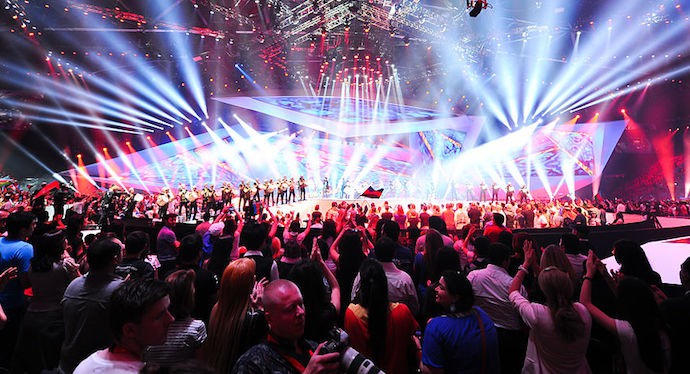It’s that time of year again: when a continent* puts aside its differences and unites over a love of glitter, cheesily heartfelt lyrics and the power of wind machines. That’s right – Eurovision is here. And among the blindingly odd costume choices (from tin foil to horse heads), the thinly disguised politics and the endless power ballads, there are a few linguistic certainties…
*and Australia, which has defied the logic of geography for the past two years to put the UK entries to shame
The French will be French
In addition to the dreaded sound of ‘nul points’ (a term overly familiar to a UK audience), the French entry is certain to add even more French to proceedings. Why is France singing in French worth mentioning? Simply because hardly anyone else bothers. Since the rules changed in 1999 to allow countries to compete in any language they like, only one winner – Serbia in 2007 – has not sung in English.
France has started to make concessions to English in recent years, but the huge outcry when English lyrics were added to the French suggests that this will be a slow process. And given that this year, 36 of the 43 entries are sung entirely in English, I’m happy to ignore mutterings about the French playing to their English-averse national stereotype and instead celebrate a bit of welcome linguistic diversity among the English-language power ballads.
Someone will get political
Eurovision bans ‘lyrics, speeches [or] gestures of a political or similar nature’. Though you’d often be hard-pressed to notice, given the extent to which politics is tied up in every aspect of the contest. Controversies range from accusations of bloc voting to this year’s argument over the Russian contestant being banned from performing in Ukraine (where the contest is being held this year).
Eurovision politics is at its best, however, when it hides behind the songs themselves. The chorus of the Ukrainian entry in 2007 (undeniably one of the best Eurovision entries) includes the words ‘lasha tumbai’, an apparently meaningless phrase that just happened to be sung in a way that sounded like ‘Russia goodbye’. This was ambiguous enough to be allowed, which is more than can be said for Georgia’s entry in 2009. ‘We Don’t Wanna Put In’ caused an uproar because of its apparent reference to Russian Prime Minister Vladimir Putin. The country refused to change the lyrics and finally withdrew from Eurovision that year – a pretty strong effect for a bit of blatant wordplay.
The lyrics will be ‘interesting’
Eurovision would not be Eurovision without questionable lyrics to back up the baffling costume choices. Can you empathise with the lament that ‘sex with you passes by as fast as the spaceship Enterprise’? Would you like to be romanced by being told that ‘your breasts are like swallows a-nestling’? And can you believe that the UK finished second-to-last in 2007 with such sterling aviation-related innuendos as ‘would you like something to suck on for landing’?
Eurovision’s theme this year is celebrating diversity, and I truly hope that it never stops producing such a diverse array of linguistic and lyrical gems. Though those with a more competitive streak may prefer entries to follow last year’s tutorial on how to create the perfect Eurovision song.
Image via Wikimedia (CC BY-SA 3.0)
